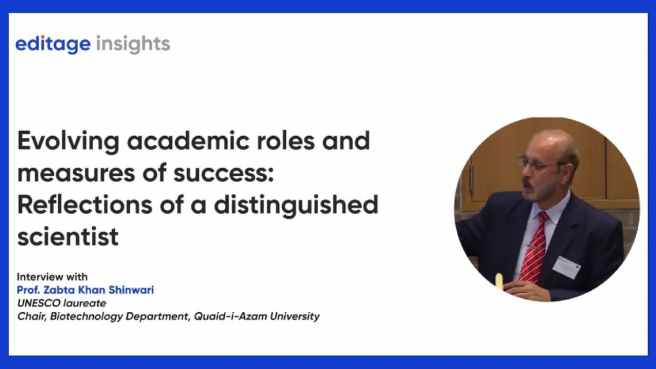How ethical conduct can be integrated within research culture: Interview with Prof. Zabta Khan Shinwari
What defines success in academia has stayed largely the same over the past few decades. Publications in high-impact journals, number of citations, recognition through prestigious grants or awards—all of these are still deeply valued. But have academic roles and progression kept pace with changing times and new challenges? What does it take to be a good—and not just successful—researcher? How can researchers have a fulfilling, impactful, and ethical career? And how can research integrity be woven into the fabric of research culture such that the way research performance is measured promotes ethical conduct?
These are some big questions for the academic community worldwide.
In this conversation with Prof. Zabta Khan Shinwari, I ask him to share his views by reflecting on his own journey as an academic. Prof. Shinwari is a distinguished plant biotechnologist and UNESCO laureate recognized for his work on promoting research ethics. He is currently Chair, Biotechnology Department, Quaid-i-Azam University, Islamabad, and in the past, served as Secretary-General of Pakistan Academy of Sciences.
This is the second of a three-part interview series. In the first segment, Prof. Shinwari shared views on what a researcher needs to know about the milestones to aim for given the shifting priorities of research and the focus on research impact. In this segment, Prof. Shinwari talks about the research integrity oath he introduced in his lab earlier this year and what he hopes this initiative will achieve. He also discusses a multipronged approach to nurturing a research culture that promotes and rewards research and publication integrity.
[VIDEO TRANSCRIPT]
Mriganka: A few days back, you announced that every student who graduates from your lab will take an oath of integrity, honesty, responsible conduct, and service to society. And yours is the first lab in Pakistan that’s taking such an initiative. So, could you talk a little bit about this oath and what led to this initiative?
Prof. Shinwari: Yeah, thank you. This led me today that my graduate they should take an oath of integrity, honesty, responsible conduct, and service to the society, which will be a positive step, promoting ethical behavior in the academic society. Because as I said, this publication race…now, you know, sometimes, you are shocked to see on the social media that there is an article ready. For the first position of authorship, you need to pay this much; second, third, fourth, five.
So, you know, authorship is for sale and you’re shocked that a PhD person, just for the promotion, can pay or get money to publish something. Even today, there was a retraction...we are watching something. And then, plagiarism and falsification, fabrication, and all those ills that are there. What I want is that at least my student who graduates should take an oath if they believe in religion or not.
So that’s what, in France, some lab has done it. And I don’t know about any other lab in the world that they…not PhD, M.Phil., or master’s or B.S. students—whoever graduate, they should take an oath.
So, that’s why I think if we do all this, maybe someday when you write this interview and publish all this somewhere, maybe other researcher do the same way that they should be having some kind of commitment to serve humanity or the society, to contribute it. Their own behavior, ethical behavior...even if one person comes good, that will help others to follow. Maybe in my generation, 1 or 2%, next 5%, 10%.
And more importantly, I tell you one thing, whatever science I do, whatever salary I get, this money comes from your pocket, or taxpayer money. This money is not my money. It comes from the taxpayer, and they fund my project, they fund everything. So, whatever publication I do, it’s not mine. I’m getting salary and I’m getting money. Even if I get a project from U.S., that’s also taxpayer money somewhere from somebody. So, if you look at that philosophy, that’s why we have to take an oath, that we should be telling that I will be keeping public trust, trust of the society on the science, that these gentlemen who are using this money, that they are really doing something good for the society.
So that’s why we started it.
Mriganka: That’s a fantastic initiative. I’m just curious, you know, what kind of response you have received so far from students and from the wider academic community. You know, when you announced this oath.
Prof. Shinwari: Believe me that it’s highly appreciated. In fact, when I put a draft on social media also, I said those who are already registered with me as students, I said, “For you, it’s voluntarily. But in future, whoever comes, they have to agree that they have to take an oath.” But whoever is with me, they said, “Oh, sir, we are very happy.”
We had several draft, and even the one which I circulated on social media…again, I was asked to make it a little more brief, you know, that people should have every word in it. But it is being appreciated not only here, but my global partners, they are thinking to introduce the same oath in their labs too.
Mriganka: I’m just wondering, you know, because you mentioned earlier as well, France had also taken an initiative like this where PhD graduates would be required to take oaths. And, you know, I think it’s it sounds very heartening and inspiring, but I’m also wondering how taking an oath like this, you know, how much can it actually influence the behavior of scientists, especially when, you know, throughout their careers, they are likely to face pressures. Because many unethical behaviors they are eventually caused by the sort of career pressures that a lot of researchers face.
How much do you believe that an oath like this can help researchers in, you know, avoiding those pitfalls when they face those pressures?
Prof. Shinwari: Very good question. And really, you’re 100% correct that this pressure that we are having of how can we prevent someone from unethical behavior because of the career pressure? Because if I am an Assistant Professor, I need 10–15 publication in [high]-impact-factor journal to become Associate [Professor] and I’m in a far-flung area where and that too…this disaster of impact factor is another issue. So, people do unethical behavior.
But having said that, you have to guide…I said not hundred percent will keep that oath, number one. Number two, now, we are also seeing some problems in the religious extremists. And there, too, so that is…Their weakness, for me, if they are extremist, but at the same time, I use as a strength that they take oath on their own, whoever believes whatever. That if they take an oath on them, we can remind them that “Come on, man. You belong to such and such group. And this is…you said…and if [speaking in Urdu] if you sincerely practice your religion and believe that is correct, behave like that.
And thirdly, government level and international level, we have to find ways and means to have alternative ways of, you know, transparency of assessing minds, assessing scientists. If we give them some window of going out of this impact factor and if we find some other ways and means, some other criteria, like service to the society, like you know, other things…collaboration, international linkages, science journalism, writing for some good articles in the newspaper, for example, and many, many other things.
Mriganka: I wanted to ask what you thought about how research integrity and publication integrity can be woven into the fabric of research culture and how researchers eventually progress in their careers.
Prof. Shinwari: So, I will give you three or four things more to this, adding to this. Number one, promoting responsible conduct. And that conduct, you have to have some kind of training and education on research ethics. It’s not simply saying. They need to have kind of exposure so that you promote a culture of transparency and collaboration, that they interact with different people.
And you also have accountability and oversight mechanisms. You look at your people and if you are a vice chancellor—I remain a vice chancellor, I remain a dean, I remain a chair—so, the people that are working with me, I should have an oversight and then what are they doing? But if I ask them to put my name first, then how can I stop them? So it’s, you know, you have to ensure as a leader, the research methodology, the data accuracy, and report findings truthfully. That’s also, you know…
Number two, take it little more encouraging open science. Now, this open science is not a local phenomenon. This is global, like open science practices, data sharing, and pre-registering the studies. You have institutional biosafety/bioethics committees, you have transparency mechanisms, reproducibility of science, etc.
So, all this open science mechanism…under UNESCO, we are working…InterAcademy Partnership is another, well, I’m part of the group. So, that internationally, we have to facilitate these people for integrity of science.
And then, editorial integrity. Those who are publishers, those who are having journals, their integrity, that they…peer review processes, for example, so that they adhere to ethical standards not only for the money that they’re getting, they too behave in the way that their whole editorial processes, what we call it, Transparency and Openness Promotion (TOP) that do these practices involve that mechanism in place.
And number four, we create a supportive culture. I mean, we don’t leave a man in a jungle. We provide them enabling conditions, so their behavior is ethical. Otherwise, you know, cutting story short, collaborating with stakeholders, regular meetings of different stakeholders like administration, publishing, funding agencies—they have their own role—scientific journals. So, if we do all this...so, I think this is a fabric of research culture of the various stakeholders that will promote responsible conduct: by encouraging open science, ensuring editorial integrity, creating a supportive culture, collaborating with the stakeholders—all this will help to have an environment that is conducive for scientists with integrity.
And that will upheld the behavior. And that should be rewarded then. If they do that, reward them with whatever…promotion, money, or increment. So this is, I think, not a simple way that somebody takes an oath and gone, but that has multiple kind of story behind all this.
Click here to watch the third and final segment, where Prof. Shinwari talks about what he believes will be important factors that will shape research careers in the future.
You're looking to give wings to your academic career and publication journey. We like that!
Why don't we give you complete access! Create a free account and get unlimited access to all resources & a vibrant researcher community.

This content belongs to the Career Growth Stage





View Comments